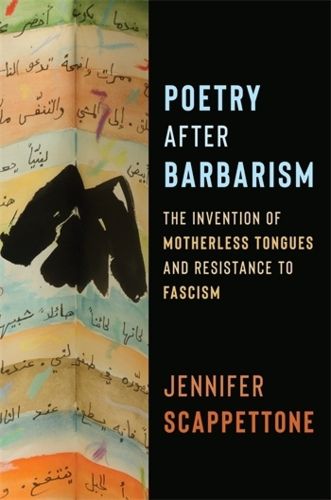Readings Newsletter
Become a Readings Member to make your shopping experience even easier.
Sign in or sign up for free!
You’re not far away from qualifying for FREE standard shipping within Australia
You’ve qualified for FREE standard shipping within Australia
The cart is loading…






Against a backdrop of xenophobic and ethnonationalist fantasies of linguistic purity, Poetry After Barbarism uncovers a stateless, polyglot poetry of resistance-the poetry of motherless tongues. Departing from the national and global paradigms that dominate literary history, Jennifer Scappettone traces the aesthetic and geopolitical resonance of "xenoglossic" poetics: poetry composed in the space of contestation between national languages, concretizing dreams of mending the ruptures traced to the story of Babel. As global migration, aerial bombardment, and the wireless telegraph shrank distances with brute force during the twentieth century, visions of transcultural communication emerged in the hopes of bridging linguistic difference. At the same time, evolving Fascist ideologies denied the reality of cultural admixture and the humanity of the stranger.
Authors who write xenoglossic verse occupy languages without a perceived birthright or sanctioned education; they compose in ecstatic "orphan tongues" that rebuff nationalist ideologies, on the one hand, and globalization, on the other, uprooting notions of belonging ensconced in nativist metaphors of milk, blood, and soil while rendering the reactionary category of the barbarian obsolete. Raised within or in the wake of fascism, these poets practice strategic forms of literary and linguistic barbarism, proposing modes of collectivity that exceed geopolitical definitions. Studying experiments between languages by immigrant, refugee, and otherwise stateless authors-from Baroness Elsa von Freytag-Loringhoven to Emilio Villa, Amelia Rosselli, Etel Adnan, LaTasha N. Nevada Diggs, Chika Sagawa, and Sawako Nakayasu-this book explores how poetry can both represent and jumpstart metamorphosis of the shape and sound of citizenship, modeling paths toward alternative republics in which poetry might assume a central agency.
$9.00 standard shipping within Australia
FREE standard shipping within Australia for orders over $100.00
Express & International shipping calculated at checkout
Against a backdrop of xenophobic and ethnonationalist fantasies of linguistic purity, Poetry After Barbarism uncovers a stateless, polyglot poetry of resistance-the poetry of motherless tongues. Departing from the national and global paradigms that dominate literary history, Jennifer Scappettone traces the aesthetic and geopolitical resonance of "xenoglossic" poetics: poetry composed in the space of contestation between national languages, concretizing dreams of mending the ruptures traced to the story of Babel. As global migration, aerial bombardment, and the wireless telegraph shrank distances with brute force during the twentieth century, visions of transcultural communication emerged in the hopes of bridging linguistic difference. At the same time, evolving Fascist ideologies denied the reality of cultural admixture and the humanity of the stranger.
Authors who write xenoglossic verse occupy languages without a perceived birthright or sanctioned education; they compose in ecstatic "orphan tongues" that rebuff nationalist ideologies, on the one hand, and globalization, on the other, uprooting notions of belonging ensconced in nativist metaphors of milk, blood, and soil while rendering the reactionary category of the barbarian obsolete. Raised within or in the wake of fascism, these poets practice strategic forms of literary and linguistic barbarism, proposing modes of collectivity that exceed geopolitical definitions. Studying experiments between languages by immigrant, refugee, and otherwise stateless authors-from Baroness Elsa von Freytag-Loringhoven to Emilio Villa, Amelia Rosselli, Etel Adnan, LaTasha N. Nevada Diggs, Chika Sagawa, and Sawako Nakayasu-this book explores how poetry can both represent and jumpstart metamorphosis of the shape and sound of citizenship, modeling paths toward alternative republics in which poetry might assume a central agency.